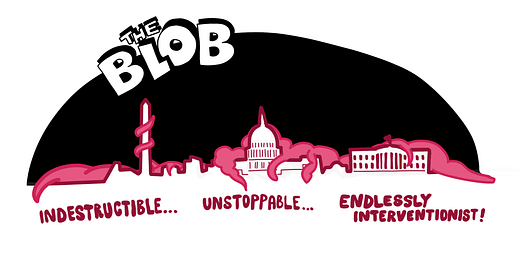TWIB: Havana Syndrome Syndrome--a malady of the Blob
Plus: Fighting over Ukraine, Omicron I-told-you-so, Iran-related blunders, etc.
Welcome to The Week in Blob, our Friday take on international news and the nefarious doings of the US foreign policy establishment.
I first became skeptical of “Havana Syndrome”—a malady supposedly afflicting US government personnel around the world and supposedly caused by some exotic weapon deployed by some enemy—in May of this year.
That’s when I read a New York Times story about the syndrome that recounted this piece of evidence for it: In 2020 “a military officer serving overseas pulled his vehicle into an intersection, then was overcome by nausea and headaches, according to four current and former officials briefed on the events. His 2-year-old son, sitting in the back seat, began crying. After the officer pulled away from the intersection, his nausea stopped, and the child stopped crying.”
Hmmm… Nausea. Crying. Started. Stopped. Must be the Communists!
Granted, if I was that father, I would consider that a weird experience. But if I was the US government, and I was fielding anecdotes over a period of years from any of millions of military and civilian personnel stationed all over the world, I would expect that some of the anecdotes would be pretty weird. That’s the way life is. Sometimes weird stuff just happens.
However, I’m not the US government, and the US government has been less dismissive of these kinds of anecdotes. This year Congress passed the HAVANA Act to provide financial support for sufferers of Havana Syndrome. CIA Director William Burns warned Russian officials that there would be “consequences” if Russia was found responsible for Havana Syndrome. Secretary of State Antony Blinken vowed to “do absolutely everything we can, leaving no stone unturned, to stop these occurrences as swiftly as possible.”
Havana Syndrome has also been taken seriously by various other players in the foreign policy establishment: journalists (such as the authors of that credulous New York Times story), podcasters (such as Ben Rhodes and Tommy Vietor, who emoted about it on their Pod Save the World podcast a couple of months ago) and think tankers.
Happily, there are people who have critically examined the evidence for Havana Syndrome—such as the authors of a whole book on it, and the authors of a government-commissioned report on it, and, most recently, the journalist Natalie Shure, who put together an overview of the evidence in Matt Yglesias’s Slow Boring newsletter last week. And it’s looking more and more like my skepticism was warranted. The authors of the government-commissioned report, for example, concluded that the unnerving sound in Cuba that started this whole thing in 2016—the sound thought to have been emitted by a “sonic weapon”—was most likely emitted by an exotic species of cricket. And it’s a species with no known Communist ties.
The best guess is that “Havana Syndrome” is a “mass sociogenic illness”—a melange of symptoms, some real, some imagined, all attributed to a single cause that doesn’t, in fact, exist (but discussion of which generates more and more reports of symptoms). We don’t know that for sure, but, pending the arrival of new evidence, it’s the most reasonable hypothesis: Havana Syndrome was never real.
What is real, I believe, is Havana Syndrome Syndrome. That’s my term for the set of psychological tendencies that led people in the Blob to take Havana Syndrome seriously. And I think this same set of tendencies helps explain why US foreign policy has been such a mess for so long. Three tendencies, in particular, are worth noting:



